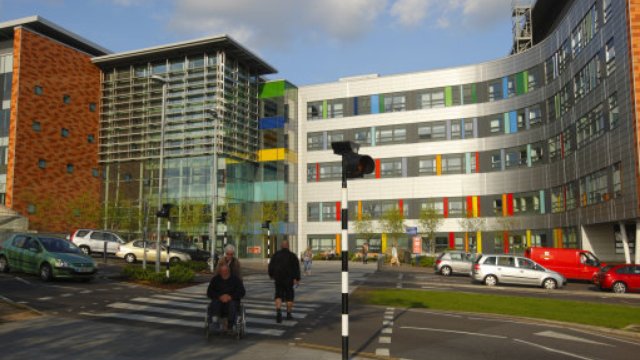A&E At Portsmouth's QA 'Putting Patients At Risk'
9 June 2016, 07:21

Inspectors say patients at Portsmouth's QA Hospital are being put at 'unacceptable risk' by its overcrowded, 'chaotic' A&E department.
They found 16 ambulances - one-third of the emergency ambulance fleet for Hampshire - queueing outside earlier this year, and ill people waiting in corridors.
Portsmouth's NHS Trust says it's 'very sorry' and 'working hard to make improvements'.
In a report about the state of the hospital's emergency department, Care Quality Commission (CQC) officials described how they even had to intervene at some points to ensure patients were safe.
They noted ``regular, significant and substantial overcrowding'' in the emergency department with patients being forced to wait for care in corridors and in ambulances.
To free up ambulances some patients were forced to wait in a ``Jumbulance'' - an ambulance vehicle that could accommodate up to four waiting patients - which inspectors said was ``cold and unsuitable for the purpose for which it was frequently being used''.
Because of hold-ups at the hospital, ambulances were unable to get to other patients with life threatening injuries in the appropriate time, inspectors said.
During the inspection, 11% of patients with serious conditions - such as sepsis, chest pain or a fractured neck or femur - waited more than half an hour before they were triaged.
The trust was falling far behind national targets to treat or admit patients within four hours of their attendance at A&E. In January the national average was 83% of patients but at Queen Alexandra Hospital, which is run by Portsmouth Hospitals NHS Trust, the target was met for just 68.8% of patients.
Staff recognised that the standard of care was ``unacceptable'' but described a culture of ``learned helplessness'' within the organisation, inspectors added.
The CQC rated the trust ``inadequate'' for its urgent and emergency services and ``requires improvement'' for medical care.
It has ordered the trust to make a series of improvements to emergency care, including stopping using the so-called Jumbulance unless there is a major incident.
Professor Edward Baker, CQC's deputy chief inspector of hospitals, said:
``It is a matter of some concern that, despite previous assurances, the trust has been failing to manage emergency admissions and this has been affecting partner organisations who may already be stretched beyond capacity.
``To ensure swift and effective improvement takes place, we have decided to place conditions on the trust's registration to ensure that emergency admissions are managed effectively and that patients are assessed and treated in a timely manner.
``While we have placed conditions on the registration, it is clear that the trust cannot achieve these improvements on its own. It will require the combined determination and effort of the whole health and social care community in the area to ensure that the level of service that the people of Portsmouth are entitled to expect is consistently provided.''
Responding to the report, Portsmouth Hospitals NHS Trust Interim Chief Executive, Tim Powell, said:
"We recognise the picture painted by the CQC in this report and we are very sorry that we have failed to provide to our patients, on a consistent basis, the high standards of care that we expect of ourselves. We also apologise for any problems that this, in turn, has caused our health partners, including the local ambulance service.
"We fully accept the inspector's findings and we are now working hard to make the improvements that will ensure we have a much more efficient emergency department in future. We have already made some changes and over the coming weeks and months we will be doing more. Our first priority is to ensure patient safety within the emergency department.
"It will take time to make all of the necessary improvements but we are determined to ensure that by the time of maximum demand in our emergency department, next winter, our service will be better. We have changed the way in which some patients are admitted to the Acute Medical Unit, redirecting those patients who do not need the clinical skills of the ED team to other pathways and promoting the fact that GPs can refer urgent patients directly to ambulatory services and our outpatients clinic.
"We will also be working to reduce the number of medically fit patients who are delayed in hospital by making our care more consultant-led, increasing the number of times patient care is reviewed each day by a senior doctor and working more closely with our health and social care community colleagues to remove delays in the patient treatment and discharge pathway.
"We have already taken steps to comply with the enforcement notice issued recently by the CQC. We immediately ensured the large multi-occupancy ambulance, known as the 'jumbulance' is no longer used; we have appointed a senior leader, Dr Rob Haigh, as the Executive Director for the Emergency Care pathway; we have put in place an escalation system and we are providing the CQC with daily monitoring information.
"We will now place greater emphasis upon prioritising tests and investigations, reviews and referrals and will increase the focus on reducing delays to patient discharge.
"We will work closely with our health system partners and we are progressing our Emergency Care Improvement Programme (ECIP), which focuses on improving performance across both health and social care, helping to further improve outcomes and patient experience as we strive to ensure we provide the very best care for our patients, who should be at the very heart of everything we do.
"I am confident that together the Trust leadership, our hard working staff and our health partners will make the improvements needed."






